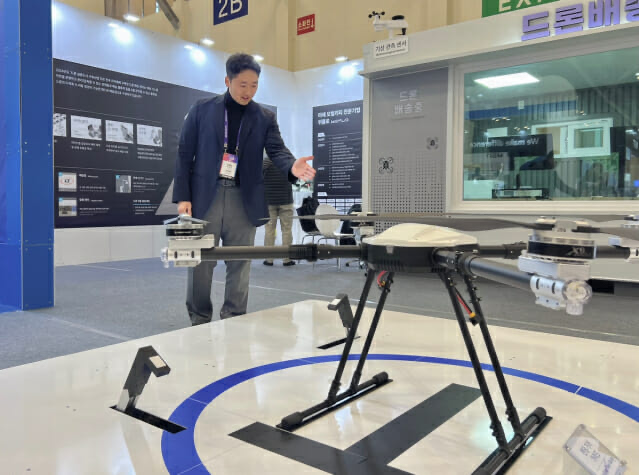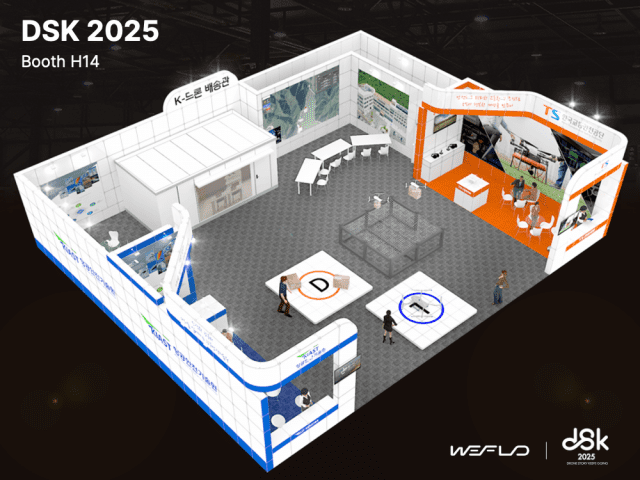Jeongwan Koh, COO of WEFLO "verti-Pit QC To Deliver In First Half Of This Year"

From delivery drones delivering household goods to industrial drones inspecting construction sites to emergency drones saving lives. As drones penetrate deeply into our daily lives, managing aircraft safety is also emerging as an important task.
Safety problems caused by airframe defects are feared to act as a potential impediment to the growth of the drone industry. In the drone commercialization and mass production stage, the importance of quality management is more emphasized.
WEFLO, a flight vehicle inspection startup, jointly operated the "K-drone delivery center" with the Korea Air Safety Technology Institute (KIAST) and the Korea Transportation Safety Authority (TS) at the "DSK 2025" held in BEXCO, Busan from February 26 to 28, and suggested safety management measures at the drone delivery site.
Meeting at the scene, Jeong-wan Koh, COO of WEFLO, explained the main value and business growth of WEFLO drone inspection technology.
"Safe drone delivery, pre-take-off inspection"
The "drone delivery center" installed at the K-drone delivery center is an integrated solution for efficient inspection and safe delivery of drones. It consists of a control building, a logistics building, and a take-off and landing pad. Safe delivery is supported through integrated operations such as managing delivery situations, checking aircraft, and computerizing data.
The inspection pad checks the stability of the take-off and whole body in a non-contact manner through a multi-modal sensor developed by WEFLO. Safety management can be advanced by linking the Korea Transportation Safety Authority's check list for air quality inspection.
The inspection facility introduced by WEFLO in this exhibition improved system performance by improving sensor pads and delivery infrastructure, which are key components of existing models.
Previously, only abnormalities in the drone drive unit, such as motors, blades, and ESC conditions, could be confirmed, but the scope of inspection has been expanded to check a total of six items, including the soundness of the aircraft and poor fastening (motor and blade direction).

The failure status of major parts has been improved so that they can be checked by subdividing them into normal, failure, and inspection requirements. An automatic recording system linked to the TS checklist was introduced and the inspection results were computerized, and a landing gear guide for each aircraft was provided to enable consistent measurement of inspection results.
Delivery infrastructure has also been improved to establish an efficient drone delivery operating environment. A weather observation sensor was linked so that the weather at the base site could be identified in real time and the flight could be checked online in advance.
"The drone delivery center can contribute to improving the efficiency and safety of the overall drone inspection and delivery process," director Koh said. "It will play a key role in providing convenient and reliable drone-based services to users."
Last year, WEFLO participated in the Ministry of Land, Infrastructure and Transport's "Drone Demonstration City Construction Project" and established drone delivery centers in about 130 locations nationwide. A total of nine local governments, including Pocheon, Jeju, and Busan, have built 21 drone delivery bases, 81 delivery stores, and 17 drone unmanned inspection pads.

"Drone mass production site opens quality control market"
However, there is not much demand for inspections in the drone service market yet. Rather, quality management projects at sites where drones are mass-produced are expected to produce results first.
WEFLO has developed a drone quality management solution called "verti-Pit QC" that can maximize quality management efficiency and strengthen safety in the drone manufacturing stage.
verti-Pit QC is a solution that can comprehensively check 16 items such as the driving unit, safety, and mechanical defects of the drone aircraft in the final stage of drone production. It automatically inspects drones in a non-contact manner through multi-modal sensors and vision and thermal imaging cameras installed inside the equipment.
Existing drone production lines conducted flying tests to directly fly drones to check the air condition after assembling parts. This method can fall and cause additional failure, and there is a problem that it takes considerable time and cost to repair and retest.
verti-Pit QC supports comprehensive quality control while in operation after the drone is combined with the equipment just before the flying test. It is possible to prevent flying tests of defective drones in advance and prevent further failures to dramatically increase production efficiency.
COO Koh said, "If you use verti-Pit QC in the production line of 20,000 drones per year, you can shorten the inspection time by about 2,800 hours and reduce labor costs by about 55 million won."
"To lead future mobility safety standards"
"Safety must be verified first for the growth of the drone industry," COO Koh said. "We plan to contribute to the establishment of a safe and efficient mobility ecosystem in line with the commercialization of drone and air taxi (AAM) markets."
First of all, in the case of drones, the inspection product will be comprehensively expanded from the production line to the operation stage. Through the full-scale commercialization of verti-Pit QC in the production line, it focuses on maximizing the quality management efficiency of drone manufacturers and strengthening the safety of drones.
In the operational stage, it is expected that drone delivery infrastructure and drone inspection pads will improve the operational efficiency of drone service providers.
After that, it plans to develop solutions for safety inspection and management of future aviation mobility platforms such as air taxis. The goal is to contribute to improving the quality of various mobility platform industries such as drones and air taxis.
